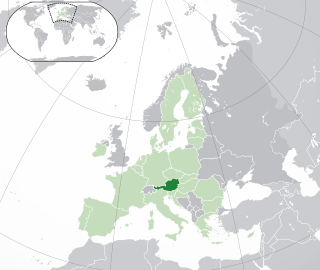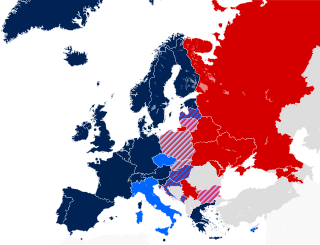Related Research Articles

The European Court of Human Rights (ECtHR), also known as the Strasbourg Court, is an international court of the Council of Europe which interprets the European Convention on Human Rights (ECHR). The court hears applications alleging that a contracting state has breached one or more of the human rights enumerated in the convention or its optional protocols to which a member state is a party. The court is based in Strasbourg, France.
Same-sex marriage, also known as gay marriage, is the marriage of two people of the same legal sex. As of 2024, marriage between same-sex couples is legally performed and recognized in 36 countries, with a total population of 1.5 billion people. The most recent jurisdictions to legalize same-sex marriage are Greece and Aruba and Curaçao in the Netherlands. Two more countries, Liechtenstein and Thailand, are set to begin performing same-sex marriages in January 2025.

Croatia recognizes life partnerships for same-sex couples through the Life Partnership Act, making same-sex couples equal to married couples in almost all of its aspects. The Act also recognizes and defines unregistered same-sex relationships as informal life partners, thus making them equal to registered life partnerships after they have been cohabiting for a minimum of 3 years. Croatia first recognized same-sex couples in 2003 through a law on unregistered same-sex unions, which was later replaced by the Life Partnership Act. The Croatian Parliament passed the new law on 15 July 2014, taking effect in two stages. Following a 2013 referendum, the Constitution of Croatia has limited marriage to opposite-sex couples.

Lesbian, gay, bisexual, and transgender (LGBT) rights in Croatia have expanded since the turn of the 21st century, especially in the 2010s and 2020s. However, LGBT people still face some legal challenges not experienced by non-LGBTQ residents. The status of same-sex relationships was first formally recognized in 2003 under a law dealing with unregistered cohabitations. As a result of a 2013 referendum, the Constitution of Croatia defines marriage solely as a union between a woman and man, effectively prohibiting same-sex marriage. Since the introduction of the Life Partnership Act in 2014, same-sex couples have effectively enjoyed rights equal to heterosexual married couples in almost all of its aspects, except adoption. In 2022, a final court judgement allowed same-sex adoption under the same conditions as for mixed-sex couples. Same-sex couples in Croatia can also apply for foster care since 2020. Croatian law forbids all discrimination on the grounds of sexual orientation, gender identity, and gender expression in all civil and state matters; any such identity is considered a private matter, and such information gathering for any purpose is forbidden as well.

Lesbian, gay, bisexual, and transgender (LGBTQ) rights in Austria have advanced significantly in the 21st century, and are now considered generally progressive. Both male and female forms of same-sex sexual activity are legal in Austria. Registered partnerships were introduced in 2010, giving same-sex couples some of the rights of marriage. Stepchild adoption was legalised in 2013, while full joint adoption was legalised by the Constitutional Court of Austria in 2016. On 5 December 2017, the Austrian Constitutional Court decided to legalise same-sex marriage, and the ruling went into effect on 1 January 2019.
Article 8 of the European Convention on Human Rights provides a right to respect for one's "private and family life, his home and his correspondence", subject to certain restrictions that are "in accordance with law" and "necessary in a democratic society". The European Convention on Human Rights (ECHR) is an international treaty to protect human rights and fundamental freedoms in Europe.
Article 3 of the European Convention on Human Rights prohibits torture, and "inhuman or degrading treatment or punishment".
Article 3 – Prohibition of torture
No one shall be subjected to torture or to inhuman or degrading treatment or punishment.

Debate has occurred throughout Europe over proposals to legalise same-sex marriage as well as same-sex civil unions. Currently 33 of the 50 countries and the 8 dependent territories in Europe recognise some type of same-sex union, among them most members of the European Union (24/27). Nearly 43% of the European population lives in jurisdictions where same-sex marriage is legal.
Bulgaria does not recognize same-sex marriage or civil unions. Though these issues have been discussed frequently over the past few years, no law on the matter has passed the National Assembly. In September 2023, the European Court of Human Rights ordered the government to establish a legal framework recognizing same-sex unions.
Moldova does not recognize same-sex marriage or civil unions. The Constitution of Moldova defines marriage as being between "a husband and a wife".
Schalk and Kopf v Austria is a case decided in 2010 by the European Court of Human Rights (ECtHR) in which it was clarified that the European Convention on Human Rights (ECHR) does not oblige member states to legislate for or legally recognize same-sex marriages.
Article 12 of the European Convention on Human Rights (ECHR) provides for two constituent rights: the right to marry and the right to found a family. With an explicit reference to ‘national laws governing the exercise of this right’, Article 12 raises issues as to the doctrine of the margin of appreciation, and the related principle of subsidiarity most prominent in European Union Law. It has most prominently been utilised, often alongside Article 8 of the Convention, to challenge the denial of same sex marriage in the domestic law of a Contracting state.
Until 2017, laws related to LGBTQ+ couples adopting children varied by state. Some states granted full adoption rights to same-sex couples, while others banned same-sex adoption or only allowed one partner in a same-sex relationship to adopt the biological child of the other.
Oliari and Others v. Italy is a case decided in 2015 by the European Court of Human Rights (ECtHR) in which the Court established a positive obligation upon member states to provide legal recognition for same-sex couples.
The second-parent adoption or co-parent adoption is a process by which a partner, who is not biologically related to the child, can adopt their partner's biological or adoptive child without terminating the first legal parent's rights. This process is of interest to many couples, as legal parenthood allows the parent's partner to do things such as: make medical decisions, claim dependency, or gain custody in the event of the death of the biological parent.
Fedotova and Others v. Russia was a case submitted by six Russian nationals to the European Court of Human Rights (ECtHR).
Azerbaijan has been a member of the Council of Europe, an international organization that focuses on strengthening democracy and human rights, since 2001. As a member, it has attracted attention for holding political prisoners, low implementation of verdicts of the European Court of Human Rights (ECtHR), and bribing Council of Europe parliamentarians to suppress negative information about its human rights record. In 2017, the Committee of Ministers launched the first ever infringement proceeding against Azerbaijan after it refused to release opposition politician Ilgar Mammadov after a 2014 ECtHR verdict that his imprisonment was unlawful. There has also been criticism of Azerbaijan's continued membership by those who believe its lack of human rights protection undermines the credibility of the Council of Europe.
Bayev and Others v. Russia was a case brought to the European Court of Human Rights by three Russian activists—Nikolay Bayev, Aleksei Aleksandrovich Kiselev, and Nikolay Alekseyev—alleging that the Russian gay propaganda law infringed on their freedom of expression guaranteed by Article 10 of the European Convention on Human Rights. On 20 June 2017, the court ruled that the applicants' freedom of expression had been compromised. The only dissent was from Dmitry Dedov, the judge elected with respect to Russia.
References
- ↑ Kathleen A. Doty Introductory Note to X and Others v. Austria (EUR. CT. H.R.) International Legal Materials Vol 53. No.4 2014 620 at 620.
- ↑ Kathleen A. Doty Introductory Note to X and Others v. Austria (EUR. CT. H.R.) International Legal Materials Vol 53. No.4 2014 at 650.
- ↑ see: LGBT rights in the European Union
- ↑ see above
- ↑ X and Others v. Austria 53 ILM 620 at 65.
- ↑ X and Others v. Austria 53 ILM 620 at 620
- ↑ above, at 620
- ↑ Application no 24941/07
- ↑ Johnson, Paul (2012). "Adoption, Homosexuality and the European Convention on Human Rights: "Gas and Dubois v France"". The Modern Law Review. 75 (6): 1136–1149. doi:10.1111/j.1468-2230.2012.00939.x. ISSN 0026-7961. JSTOR 23362509. S2CID 142526538.
- ↑ above, at 620
- ↑ X and Others v. Austria no. 19010/07, 19 February 2013
- ↑ X and Others v. Austria 53 ILM 620 at 649.
- ↑ X and Others v. Austria no. 19010/07, 19 February 2013
- ↑ X and Others v. Austria 53 ILM 620 at 654
- 1 2 "European Convention on Human Rights" (PDF). 1950-11-04. Retrieved 2019-12-28.
- ↑ Kathleen A. Doty Introductory Note to X and Others v. Austria (EUR. CT. H.R.) International Legal Materials Vol 53. No.4 2014 620 at 620.
- ↑ X and Others v. Austria 53 ILM 620 at 640
- ↑ X and Others v. Austria 53 ILM 620 at 656.
- ↑ Kathleen A. Doty Introductory Note to X and Others v. Austria (EUR. CT. H.R.) International Legal Materials Vol 53, No.4 (2014) at 650.
- ↑ above, at 650.
- ↑ Kathleen A. Doty Introductory Note to X and Others v. Austria (EUR. CT. H.R.) International Legal Materials Vol 53, No.4 (2014) at 620.